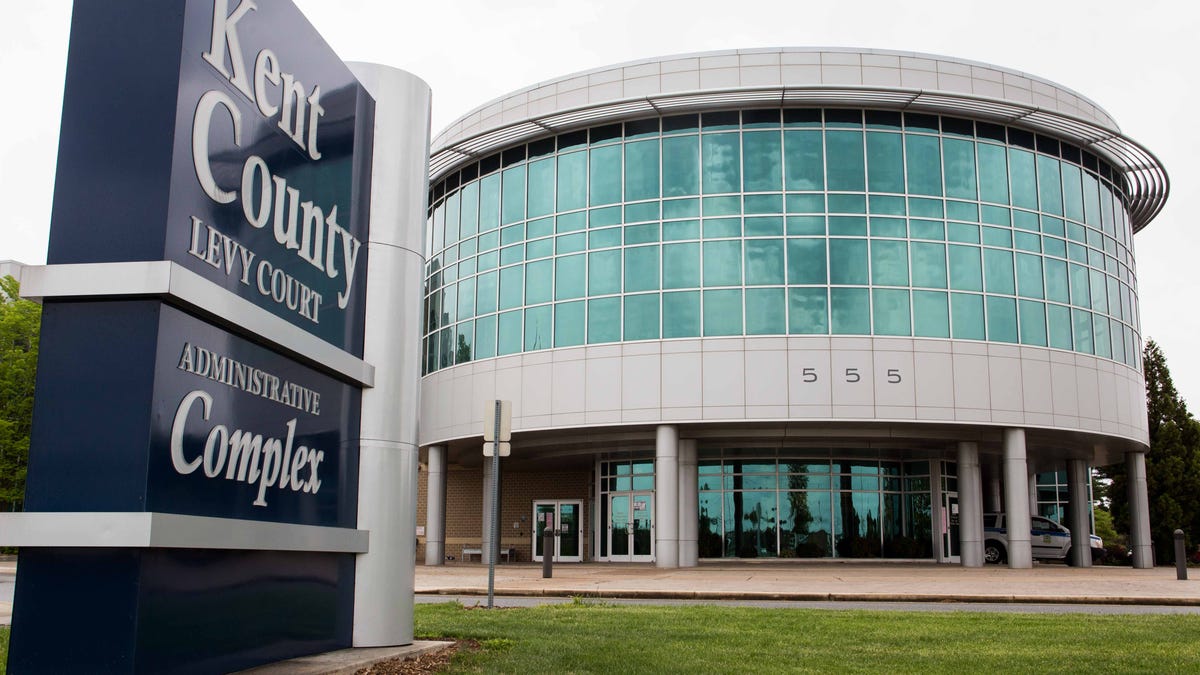South Dakota
South Dakota non-profit receives funding to develop statewide public transit plan for Native American Reservations
/cloudfront-us-east-1.images.arcpublishing.com/gray/LQDE43KXDBEY7HH3GMRSIMJKBQ.jpg)
RAPID CITY, S.D. (KEVN) – Fewer than six people per square mile, with the two most populated counties on opposite sides of the state. Of the 66 counties in South Dakota, 30 are considered rural, while another 34 are considered frontier by the US Department of Health and Human Services.
Getting to an area with more amenities can be an issue for some people. A possible study that River Cities Public Transit has recently gotten funding for could lead to a plan to provide people with public transportation across Mount Rushmore State.
“I think it would be a great idea because it would open up a lot more venues. I mean, public transportation should be accessible anywhere and everywhere. Especially in these big rural areas, it’s so spread out; it’s so vast,” explained Pine Ridge Reservation resident Bradley Hawk.
$527,520 is how much River Cities Public Transit was awarded under the Areas of Persistent Poverty Program to develop a transit plan that would reach remote areas of South Dakota.
“Let’s face it, the cost of transportation, car repairs, and all of that is going up, and we’re seeing higher demand for things like their jobs and employment and getting people to work as well as medical,” explained River Cities Public Transit executive director Ron Baumgart.
For the non-profit organization, the area they currently serve is an indicator of what can happen to an area with little to no way of getting around efficiently.
“From what we have learned from the areas where we do provide services if you can’t get to your job, you can’t keep a job, and if you can’t get to your therapy appointment every week, your health goes down,” explained Baumgart.
The grant also gives them the reach they would need to study Native American Reservations across the state to see what they would need in order to set up a functioning statewide public transportation plan that would help that area.
“Study these areas of persistent poverty that would benefit from better coordination of transportation and transit that’s out there to get these folks to jobs, health care, and whatever else they might need,” explained Baumgart. “We just hope that we can find open doors when we go to these areas and that people will be honest with us about their needs, and I think that’s really going to help this project.”
As for people like Bradley Hawk, even having these talks about how this study could help many if it does go well is reassuring.
“I have relatives that do come back and forth, and they do make it without a car, and it’s just mind-blowing to me, but having that, you know that they’re safe, they’re taken care of, and they’re on something that’s, you know, affordable,” said Hawk
River Cities Public Transit is communicating with the Federal Transit Administration to work out a plan to have enough research and travel time to fully study the public transportation needs of each area.
Copyright 2023 KEVN. All rights reserved.

South Dakota
South Dakota governor signs eminent domain ban, leaving Summit pipeline’s future unclear
Trump declares energy emergency, vows to unleash US fossil fuels
Donald Trump says he wants to unleash U.S. oil and gas.
South Dakota Republican Gov. Larry Rhoden announced Thursday that he signed a bill banning the use of eminent domain for carbon dioxide pipelines, delivering a victory to property-rights activists who spent several years advocating for the bill.
It was a blow to Ames-based Summit Carbon Solutions, which is seeking to build a carbon capture pipeline that would serve ethanol plants in South Dakota, Iowa, Nebraska, North Dakota and Minnesota. South Dakota was the last remaining state where it hoped to gain a pipeline permit and eminent domain rights to obtain the needed land for the project from property owners unwilling to negotiate the rights.
Eminent domain is the right to access private property for projects that benefit the public, with compensation determined by a court. It’s commonly used for projects such as electrical power lines, water pipelines, oil pipelines and highways.
The legislation passed the state Senate on Tuesday after passing the House in late January. It prohibits carbon pipeline developers from using eminent domain to acquire land. The issue has been at the center of a contentious debate over Iowa-based Summit Carbon Solutions’ proposed $9 billion carbon capture pipeline.
The project would transport carbon dioxide from more than 50 ethanol plants across the five states, including eastern South Dakota, to an underground storage site in North Dakota. It would qualify for billions in federal tax credits incentivizing the sequestration of heat-trapping greenhouse gas emissions.In a letter explaining his decision, Rhoden, a western South Dakota rancher and former legislator, emphasized his longstanding commitment to property rights and framed the bill as a way to restore trust between landowners and developers.
“I am no stranger to discussions about eminent domain and property rights,” Rhoden wrote. “l’ve fought for private property rights in this Capitol for over 20 years. When I was a legislator, I was the prime sponsor of legislation that reformed eminent domain to protect property rights. I don’t just care about landowners — I am a landowner.”
Supporters of the bill have argued that private companies like Summit should not be able to access land against the will of its owners. Opponents, however, contended that the measure could harm the ethanol industry, which is seeking ways to lower its carbon footprint as some states and countries limit sales of carbon-intensive fuels.
Rhoden said voluntary land-access agreements known as easements should be the path forward. He said his signature of the bill “does not kill the proposed project.”
“I encourage Summit and others to view it as an opportunity for a needed reset,” he wrote. “Voluntary easements for this proposed project will still be able to move forward.”
Summit says it will move forward with pipeline in other states
Summit, in a statement, said the ban “changed the rules in the middle of the game.”
“This kind of regulatory uncertainty creates real challenges — not just for our project, but for the ethanol plants in South Dakota that now face a competitive disadvantage compared to their counterparts in neighboring states,” Summit said. “While this presents obstacles, our project moves forward in states that support investment and innovation, and we will have more news on that soon.”
In response to a question from South Dakota Searchlight about whether the company might challenge the new law in court, Summit provided a statement that said “all options are on the table but we remain focused on working with stakeholders to support the long-term success of the ethanol industry and support the president’s goals of American energy dominance.”
“It’s unfortunate that a piece of legislation has been framed around a single company rather than addressing broader infrastructure and economic policy,” the company added.Summit has not yet received a permit from the South Dakota Public Utilities Commission. The company’s initial application was denied in 2023, largely due to the route’s conflicts with local ordinances that mandate minimum distances between pipelines and existing features. The company has since made some adjustments to its route and reapplied, and that application is pending.
The project has received permits in Iowa, Minnesota and North Dakota, while Nebraska does not have a permitting process, and some of the permits have been challenged in court.
Iowa Renewable Fuels Association President Monte Shaw said the group was disappointed by the news from South Dakota.
“An unnecessary roadblock has been thrown up between Midwest corn farmers and much needed new markets,” Shaw said in a news release. “The South Dakota law effectively bans carbon pipelines in the state. While this is horrible for South Dakota and unfortunate for nearby states, there are numerous opportunities to sequester and ways to get there that don’t include South Dakota. The demand for ultra-low carbon ethanol around the globe is so massive that, at the end of the day, no one state will be able to stop the ethanol industry from accessing that market.”
The American Carbon Alliance likewise expressed disappointment.
“This ill-advised legislation comes at a time when South Dakota farmers and ethanol producers desperately need new markets to restore profitability,” Tom Buis, the group’s CEO, said in a statement. “Instead of supporting economic growth, this decision creates unnecessary roadblocks and sends the wrong message to agriculture and rural communities.”
Sierra Club calls for rally supporting similar bills in Iowa
The Sierra Club’s Iowa chapter declared the law a “hard fought victory for property rights,” with its attorney, Wally Taylor, saying it “will effectively end Summit’s project.”
The club’s Jess Mazour, in a statement, called on the Iowa Legislature to pass similar bills, one of which, HSB287, she said passed out of the House Judiciary Committee on Thursday, beating Friday’s funnel deadline.
Mazour added that landowners opposed to carbon pipelines and the Sierra Club Iowa Chapter will hold a rally at 11 a.m. March 18 at the Iowa Capitol to push for passage of the legislation.
“Governor Reynolds and the Iowa Senate should take a lesson from South Dakota and listen to their constituents.” Mazour said.
The bill’s passage follows a shift in the South Dakota’s political landscape, with opponents of eminent domain gaining influence in the Legislature. Last year, lawmakers passed a compromise bill that imposed new restrictions on carbon pipelines and implemented new protections for landowners and counties, but did not ban eminent domain. That measure faced fierce opposition. It was referred to the ballot in November and defeated, and 14 Republican incumbents lost their legislative seats in the June primary. This legislative session, some prominent critics of eminent domain were elevated into leadership positions.
Sen. Joy Hohn, R-Hartford, is among the new crop of legislators who supported the eminent domain ban.“The use of power of condemnation by a private company for the benefit of potential future markets is not worth the dangerous precedent it sets for future generations,” Hohn said. “On behalf of South Dakota citizens and property owners across our great state, we are so grateful to Governor Rhoden.”
This story was originally published by South Dakota Searchlight, which is part of States Newsroom, a nonprofit news network supported by grants and a coalition of donors as a 501c(3) public charity. South Dakota Searchlight maintains editorial independence. Contact Editor Seth Tupper for questions: info@southdakotasearchlight.com.
South Dakota
Obituary for Dr. Daniel G. Tynan at Miller Funeral Home & On-Site Crematory

South Dakota
SD House defeats bill requiring ‘forever chemical’ labels on firefighting gear

-

 Sports1 week ago
Sports1 week agoNHL trade board 7.0: The 4 Nations break is over, and things are about to get real
-

 News1 week ago
News1 week agoJustice Dept. Takes Broad View of Trump’s Jan. 6 Pardons
-

 World1 week ago
World1 week agoHamas says deal reached with Israel to release more than 600 Palestinians
-

 Science1 week ago
Science1 week agoKilling 166 million birds hasn’t helped poultry farmers stop H5N1. Is there a better way?
-

 News1 week ago
News1 week agoChristianity’s Decline in U.S. Appears to Have Halted, Major Study Shows
-

 World1 week ago
World1 week agoGermany's Merz ‘resolute and determined,' former EU chief Barroso says
-

 Technology1 week ago
Technology1 week agoMicrosoft makes Copilot Voice and Think Deeper free with unlimited use
-

 Politics1 week ago
Politics1 week agoSome Republicans Sharply Criticize Trump’s Embrace of Russia at the U.N.
















